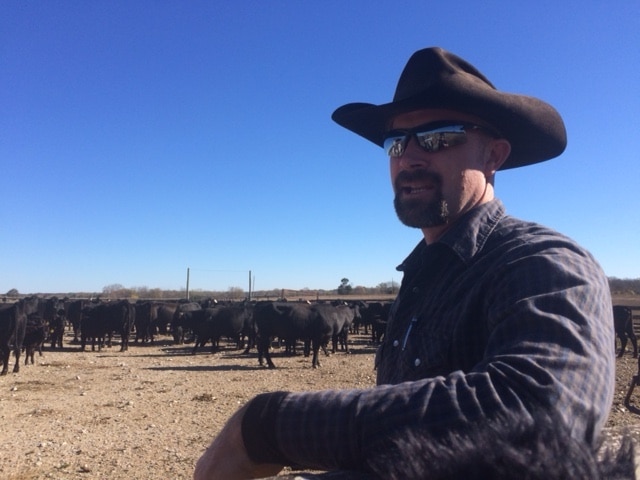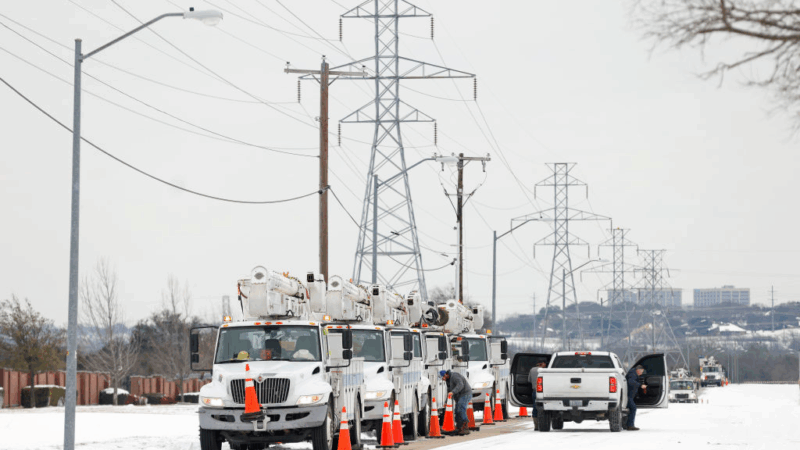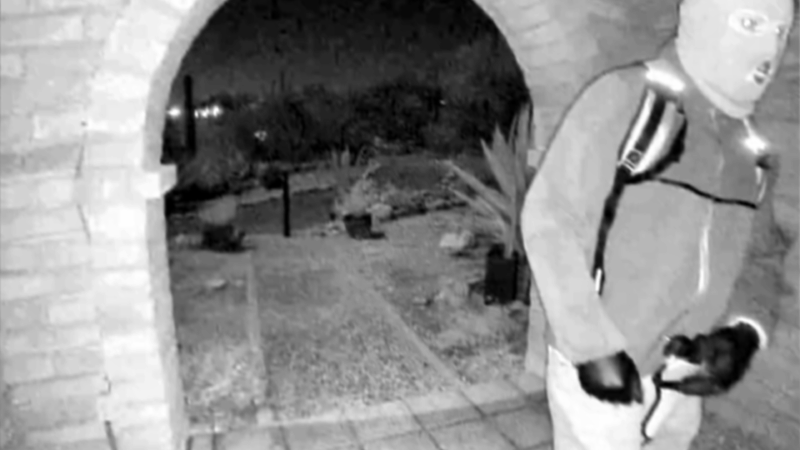Alabama Cattle Ranchers Hit Hard by Drought
It’s breeding season at Cow Creek Ranch in Aliceville, AL.
Owner Joy Reznicek and some of her ranch hands are preparing to artificially inseminate a few dozen cows.
They move one particularly stubborn cow into the squeeze machine — which gently hugs the cow so she can’t move. That’s when Brice Allsup gets to work. He slides on an arm-length plastic glove, takes a long, slender tube filled with all the ingredients needed to make a baby cow and inseminates the animal. It’s not glamorous, but Allsup’s a pro with more four decades of experience.
“I tell people I get up to my armpits in my work and I can take a lot of crap,” Allsup says.
He won’t know for five months whether the cow is pregnant. The long wait will feel even longer if it doesn’t rain in Alabama.
After months of warm, dry weather, it did finally rain this week. But a few days of precipitation won’t erase months of drought. The lack of rainfall has crippled the state’s $2 billion cattle industry. The drought has forced ranchers to buy hay from out-of-state and if the dry weather persists this winter, things could get a lot worse for farmers and their herds.
Cows eat lots of grass. But grass doesn’t grow without water. Most of the pastures on Joy Reznicek’s 2,400-acres are yellow and dusty. Her ranch looks more like the parched Nevada desert than the rich grasslands of western Alabama.
“It’s very abnormal,” she says. “We would typically see a lot of mud around here this time of year. So, we are abnormally dry.”
Most of Pickens County is under extreme drought, according to the U.S. Drought Monitor. Before this week’s rain, it had been months since the area had seen any precipitation.
No rain means no grass for her cows to feed on. Reznicek has needed to tap into her hay reserves. Normally they wouldn’t need to do that until almost February, says ranch manager Jeff Reznicek, and they’re not sure how long their stockpile can last.
“And a lot of that depends on whether or not we get some moisture come January of February,” he says. “If that happens, we’ll get a little growth out of our grass, the days will start getting longer and we’ll get some growth. But if that doesn’t happen, we could be putting hay out until the first of April or something like and we don’t want to get into that situation.”
Creeks and ponds are drying up all over Alabama. So, not only are ranchers having to buy hay but water too. Ranchers that can’t afford to do this are forced to sell off portions of their herds and the money they get from selling their cattle is dropping. Last year, a calf fetched about $1000, this year only half that.
So, Reznicek is determined to breed as many cows as possible. But it could be in vain. A lack of water and food can send cows into survival mode. When this happens to pregnant cows, those expectant mothers often abort their calves.
“It begins shedding those unnecessary things to survive,” she says. “A pregnancy is not a necessary thing for that [cow] to survive, in fact, it’s taking nutrients away from that cow. So, it’s kind of the evolution of that cow surviving.”
But it’s not all bad news for Alabama ranchers. Forecasters predict this winter will be warmer and not as wet as normal. That’s good for cows because their hair is a poor insulator.
When they’re cold and wet, cows burn more energy and need to eat more. Warmer weather means less stress on cows and Reznicek hopes that will make her hay supply last a little longer.
Ilia Malinin, figure skater favored for gold, finishes 8th
Malinin, undefeated since 2023, stumbled and fell multiple times, landing far off the podium. Mikhail Shaidorov of Kazakhstan won gold in an upset that shocked even himself.
DHS says immigration agents appear to have lied about shooting in Minnesota
Julio Cesar Sosa-Celis was shot in the leg during the incident. Another Venezuelan man was also accused of attacking an immigration officer.
Venezuela debates sweeping amnesty for political prisoners
After the fall of Nicolás Maduro, the Venezuelan regime promise amnesty and reconciliation — but for hundreds still jailed and thousands facing charges, justice remains uncertain.
It’s been five years since catastrophic Texas blackouts. How much has changed?
Power companies say they're better prepared for extreme weather, but challenges remain to electricity production as the state's demand grows
FBI releases description of suspect, increases reward in Nancy Guthrie case
The FBI describes the armed man caught on Nancy Guthrie's camera as 5-foot-9-inches to 5-foot-10 and of average build. The 84-year-old mother of Savannah Guthrie has been missing since Feb. 1.
Virginia court allows Democrats’ redistricting vote in their plan to counter to Trump
The ruling allows an April election where voters can let the legislature draw a new congressional map. It could help Democrats win more House seats. Republicans might still fight it in court.








